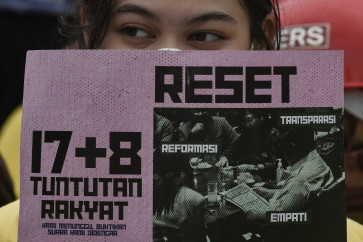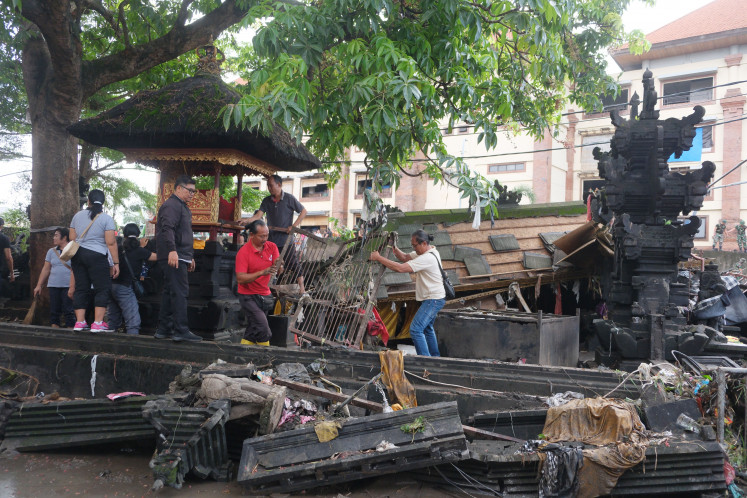Popular Reads
Top Results
Can't find what you're looking for?
View all search resultsPopular Reads
Top Results
Can't find what you're looking for?
View all search resultsMERS fears haunting millions of haj pilgrims
As more than 2 million Muslims from all over the world begin arriving in Saudi Arabia for the annual haj pilgrimage, a new surge of cases of Middle East respiratory syndrome (MERS) in Riyadh, the capital of Saudi Arabia, has triggered fears that another outbreak is beginning
Change text size
Gift Premium Articles
to Anyone
A
s more than 2 million Muslims from all over the world begin arriving in Saudi Arabia for the annual haj pilgrimage, a new surge of cases of Middle East respiratory syndrome (MERS) in Riyadh, the capital of Saudi Arabia, has triggered fears that another outbreak is beginning.
In the span of a week, Riyadh has seen more than 40 cases of the disease, 15 of them affecting health workers.
'Within the last 48 hours alone, there have been 15 new cases and three deaths,' Indonesian Health Ministry research and development agency head Tjandra Yoga Aditama said on Saturday.
King Abdul Aziz Medical City, one of the country's largest medical facilities, had seen a spread of the corona virus during the past few weeks, which started as one case. Its emergency ward has been forced to close.
The spike in cases is the largest since the peak of the virus' spread last summer, sparking fears among 168,000 Indonesians who will perform the haj pilgrimage from September 20 to 25.
The first few groups of pilgrims started going to Saudi Arabia on Friday.
The risks of contracting the virus are compounded by the fact that 54 percent of this year's Indonesian pilgrims can be categorized as those who are prone to sickness as the government prioritizes the elderly to be flown to Saudi Arabia.
'This number is greater than last year's 53 percent,' the head of the Health Ministry's health center for haj, Fidiansjah, recently said.
Fidiansjah said there were three groups of people at risk of contracting diseases during the pilgrimage.
Pilgrims sleep in hot, shared tents and walk barefoot; such conditions make it extraordinarily easy for a virus like MERS to spread and could be devastating because MERS kills about 50 percent of the people it infects, according to Fidiansjah.
The first group at risk of contraction are those over 60 years of age. The second group are those who are below 60 but already sick. The last group consists of those over 60 and also sick.
'For this particular group, we need to be extra cautious,' Fidiansjah said.
These three groups will be given different bracelets, with colors corresponding to their groups, red being the most at risk group.
'When medical officers see their bracelets, they will be more alert. For haj pilgrims wearing red bracelets, the monitoring will be more intense,' said Fidiansjah.
Medical officers and the elderly are among those most prone to the MERS virus.
'Among the new cases there is a foreign medical officer and also a 109-year-old Saudi,' Tjandra of the Health Ministry said.
The latest deaths occurred in Riyadh, and the victims were all Saudis aged 65 to 86, the Saudi Arabian Health Ministry said.
The new cases bring the total number of people contracting the virus to 1,134 with a death toll of 486.
Saudi Arabia has been worst hit by the corona virus, which started to appear in 2012.
Despite being the home of the virus, officials declared last year's pilgrimage epidemic-free after the oil-rich kingdom, home to Islam's holiest sites, engaged thousands of health workers to make sure pilgrims were protected from two deadly viruses ' Ebola and MERS.
This year, Saudi Arabia will get help from the World Health Organization (WHO).
'Because new MERS cases keep appearing, the WHO will send its team to Saudi Arabia. The same thing happened during the recent MERS outbreak in South Korea due to the seriousness of the situation,' Tjandra said.
MERS is considered a deadlier but less infectious cousin of the Severe Acute Respiratory Syndrome (SARS) virus that appeared in Asia in 2003 and killed hundreds of people, mostly in China.
Its symptoms can include fever, coughing and shortness of breath.
There are no approved vaccines against MERS, which is believed to originate in camels, prompting officials to mull a ban on the sacrificing of camels during the pilgrimage.
'Data shows that more than 50 percent of the camels in Saudi Arabia have MERS,' said Tjandra. 'A camel, especially a young one, could spread the virus within a radius of 1 meter. So I implore our pilgrims to stay away from camels.'










